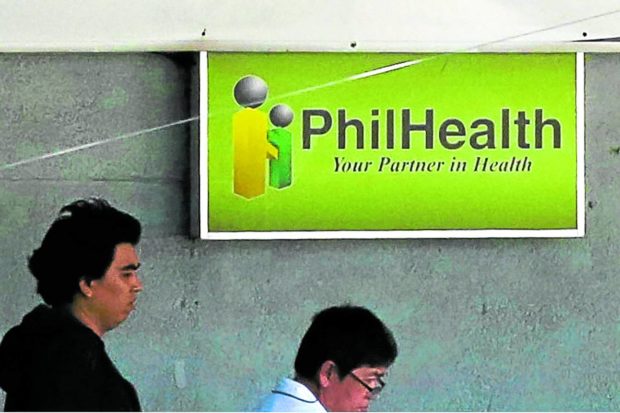
MOUNTING DUES Private hospitals have long complained about PhilHealth’s delayed payments for claims, which had ballooned to more than P21.1 billion by mid-2021. —INQUIRER FILE PHOTO
Seven private hospitals in Iloilo City are pushing through with their plan to sever ties with the state-run Philippine Health Insurance Corp. (PhilHealth) beginning Jan. 1 due to unpaid claims amounting to more than P895 million.
“Starting (Dec. 28), all patients admitted to the hospitals will be informed that they can no longer obtain PhilHealth benefits and they will have to pay in full all charges, including professional fees of doctors,” Dr. Danilo Encarnacion, president and chief executive of Metro Iloilo Hospital and Medical Center Inc., told the Inquirer on Monday.
“The patients can seek reimbursement (directly) from PhilHealth,” Encarnacion said.
Other hospitals that will not renew their affiliation with PhilHealth are the Iloilo Mission Hospital, St. Paul’s Hospital of Iloilo, Iloilo Doctors’ Hospital, Medicus Medical Center, The Medical City Iloilo and Qualimed Hospital Iloilo.
Hospital heads met with their respective medical staff on Monday afternoon to brief them on the decision to disengage with PhilHealth and discuss how this would be implemented.
The seven private hospitals serve patients from all over Western Visayas, which include the provinces of Antique, Aklan, Capiz, Guimaras, Iloilo and Negros Occidental.
They have a combined bed capacity of 1,600. Only one small private hospital and two regional government hospitals will have PhilHealth accreditation starting Jan. 1.
Encarnacion said they were forced to push through with their plan after a Dec. 20 meeting with PhilHealth officials failed to produce an assurance that the unpaid claims would be settled.
He said the state health insurer had informed the seven hospitals that the unpaid claims would be paid through PhilHealth’s Debit-Credit Payment Method 3 (DCPM), wherein PhilHealth will initially pay 60 percent of the claims and the remaining 40 percent upon completion of processing requirements.
Encarnacion said this was not the solution as the DCPM was already an existing mechanism that failed to prevent the piling up of unpaid claims.
He said the seven hospitals in Iloilo City were willing to reconsider their move to disaffiliate from PhilHealth if 80-85 percent of their claims would be settled.
Major issues
PhilHealth said it would continue reconciliation meetings with private hospitals to determine the amount that they would get from the state insurer.
Among the matters to be resolved are the denied claims and those that were returned to the hospitals for deficient requirements, which PhilHealth does not consider as payable but which hospitals include in their claims, according to PhilHealth spokesperson Shirley Domingo.
“This means we are reconciling the amount payable by PhilHealth to them. What we are saying is that the RTH [return to hospital] and denied [claims] have to be accounted for,” Domingo said at the Laging Handa briefing on Tuesday.
Claims returned to the hospital may be refiled while those denied may be appealed, but while these have yet to be settled, PhilHealth would not yet pay, she said.
She said the agency has met with the Far Eastern University-Dr. Nicanor Reyes Medical Foundation (FEU-NRMF) and the latter agreed to continue the reconciliation meeting.
Domingo said there might be another meeting to reconcile the figures from Iloilo City hospitals that have announced plans to disengage with PhilHealth.
She renewed her appeal to private hospitals not to proceed with the “PhilHealth holiday” as this would be a burden to PhilHealth members.
The Private Hospitals Association of the Philippines Inc. (PHAPI) earlier called on its members to join the “PhilHealth holiday” from Jan. 1 to 5, 2022, during which hospitals will not accept claims for PhilHealth deductions for health services.
Lawmakers on Tuesday pressed PhilHealth and private hospitals to resolve their conflict through dialogue and agree on a common solution to protect their interests.
Private hospitals have long complained about PhilHealth’s delayed payments for claims, which had ballooned to more than P21.1 billion by mid-2021. As of Dec. 24, the state health insurer has fast-tracked the release of P11.64 billion worth of these claims.
“This has been a recurring problem. The two sides should agree on a common solution that protects the interests of honest health facilities and medical practitioners, on one hand, and taxpayers and PhilHealth members, on the other,” Anakalusugan Rep. Michael Defensor said on Tuesday.
Several senators on Tuesday blamed PhilHealth’s failure to address the reimbursement claims of hospitals for the impending five-day “PhilHealth holiday.”
Senators Panfilo Lacson, Grace Poe, Nancy Binay and Sonny Angara pointed to problems of corruption and inefficiency hounding PhilHealth, which has remained unabated even after a Senate investigation found its officers at fault.
Lacson said he was dismayed that the filing of charges against erring PhilHealth officers got stalled despite the pile of evidence that the Senate culled from its inquiry and later turned over to government prosecutors. Lacson and Poe agreed that PhilHealth could solve its problems if it would be run by the Department of Finance, instead of the Department of Health.
“Why? PhilHealth deals with health insurance, not health. We need somebody there who knows how to count and manage funds, not a health practitioner,” Lacson said.
Angara said senators have long been suggesting that PhilHealth examine its reimbursement procedures and hire more finance professionals, actuaries and management experts, but these recommendations were unheeded.
Binay, on the other hand, said she was concerned about PhilHealth’s patient-members having to pay for their medical expenses, especially with the lingering pandemic.
“It is sad that some hospitals have to resort to this. It is disappointing that we have raised these concerns in previous Senate committee hearings but until now, we cannot see a solution to the problems,” she said.”
PhilHealth and the DOH should get their act together to prevent more hospitals from disengaging. What good is a health insurance coverage that you can’t use? In the end, it is not PhilHealth or the hospitals that end up in a pitiful situation, but our people,” she added.